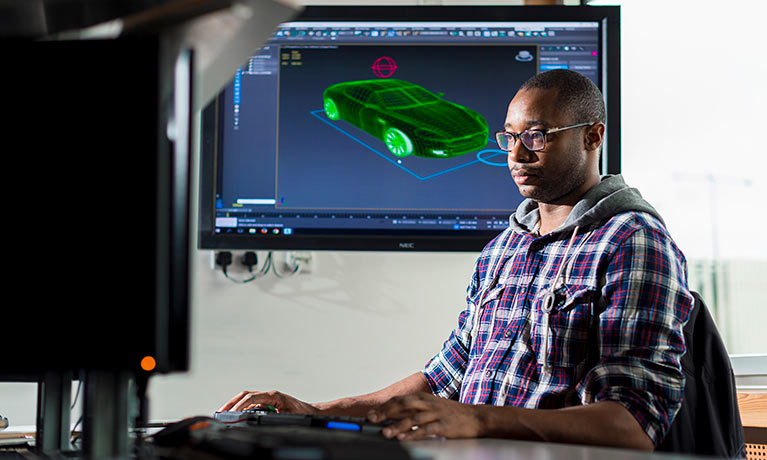Search
Artificial Intelligence and Human Factors MSc
Study level: Postgraduate
The MSc Artificial Intelligence and Human Factors course aims to produce graduates that have the theoretical, technical and transferable skills needed to gain a role in AI.
Year of entry
2024-25
Location
Coventry University (Coventry)
Study mode
Full-time
Duration
1 year full-time
Course code
EECT135
Start date
September 2024
May 2025
Course overview
Due to the increasing impact of artificial intelligence (AI) on society, we have seen a growing interest in this subject. We have seen a growth in the application of artificial intelligence in the last few years, with an anticipation that AI will continue to change how we work and live long into the future.
- The course not only aims to give you a comprehensive understanding of artificial intelligence, but also how such approaches influence the humans who develop and use them.
- Course content explores two key course themes; the fundamental and advanced theory and practice of AI, and how human factors influence and relate to AI. Content covers fundamental advanced concepts of AI such as Soft Computing Based Artificial Intelligence, Intelligent Decision Making, Neural Network Systems, and Security of Emerging Connected Systems.
- You will have the opportunity to learn the practical skills of programming using diverse AI programming languages, the use of a spectrum of tools and techniques, as well as the theoretical foundations of AI and human factors.
- You will be given the opportunity to study various modules related to human factors for AI including Connected and Autonomous Vehicles (CAV), Project Management in Engineering Organisation and Human Factors in Safety Management. The area of human factors and AI is not typically considered in many postgraduate courses focused on AI to date.
#JoinYourAIFuture Data Science and Artificial Intelligence Scholarships
The MSc Data Science conversion course and MSc Artificial Intelligence and Human Factors at Coventry University are part of the #JoinYourAIFuture programme, funded by the Office for Students. #JoinYourAIFuture is a national recruitment campaign to help address the shortage of AI and data specialists in the UK. An important aim of the campaign is to increase the number of people from underrepresented groups in the AI and data science fields, and to encourage graduates from diverse backgrounds to consider a future in these occupations.
The OfS, in partnership with the Department for Innovation, Science and Technology (DSIT, formerly the Department for Digital, Culture, Media and Sport), have agreed to provide funding to deliver scholarships, worth £10,000 each to eligible students, as part of the AI and data science postgraduate conversion course scholarship programme in the 2024-25 academic year.
Full details available under Fees and funding section.
Rated Gold Overall
Teaching Excellence Framework (TEF) 20235 QS Stars for Teaching and Facilities
QS Stars University RatingsTop 5 Student City in England (Coventry)
QS Best Student Cities Index 2025Why you should study this course
- Studying Artificial Intelligence and Human Factors MSc at Coventry University will give you the chance to examine the core elements of Artificial Intelligence. Our aim is to teach you the skills and knowledge needed to design and develop AI systems that address real-world problems.
- This could be the perfect course for those keen to work in the growing AI sector, a sector that is likely to influence society long into the future.
- The course will explore elements of AI such as programming, decision support systems, human factors and CAV, deep learning, and AI and security, providing you with opportunities to develop the skills and knowledge needed to work with AI.
- We try to provide you with opportunities to learn alongside active researchers in areas such as data science, pervasive computing, distributed computing and application, as well as innovative applications for interactive virtual worlds (subject to availability).
- The course has been designed and developed with support from research and industry experts. This helps us ensure we are teaching the most up-to-date content around latest theory and technology associated with AI and Human Factors.
What you'll study
We regularly review our course content, to make it relevant and current for the benefit of our students. For these reasons, course modules may be updated.
How you'll learn
You will have access to modern teaching tools including our online learning platform which is currently Aula, Microsoft 365 and Tophat, using learning techniques such as blended learning and flipped learning to encourage you to explore different state-of-the-art AI topics.
We stress practicality whenever appropriate and try to strike a good balance between theory and application, as well as industrial-related experience and current research topics. A variety of equipment and software are used for these purposes, including HPC clusters and a GPU server purposely built for deep machine learning and neural networks tasks.
You will be given opportunities to work with new AI and usability technology to help develop new AI solutions, at the level of real-world applications. You may get the opportunity to work with staff that have experience of commercial and research AI. You will undertake individual and group-based AI projects. By working in groups, you should have the opportunity to develop large-scale AI projects using AI-based software development methodologies with a focus on human factors within AI. Our students currently use the same AI software and technology that is used in research and industry.
Teaching contact hours
The number of contact hours may vary from semester to semester, however, on average, it is estimated 13 contact hours per week in the taught semesters with self-study approximately 25 hours each week, depending on the demands of individual modules. In Semester 3 you will focus on your project. Contact hours will be reduced and self-directed study time will increase.
As an innovative and enterprising institution, the university may seek to utilise emerging technologies within the student experience. For all courses (whether on-campus, blended, or distance learning), the university may deliver certain contact hours and assessments via online technologies and methods.
Since COVID-19, we have delivered our courses in a variety of forms, in line with public authority guidance, decisions, or orders and we will continue to adapt our delivery as appropriate. Whether on campus or online, our key priority is staff and student safety.
Assessment
This course will be assessed using a variety of methods depending upon the module. Assessment methods include coursework, essays, project and group work, viva (where we interview you about work you’ve done), practical exams (for example presentations and tests), and formal examinations.
The Coventry University Group assessment strategy ensures that our courses are assessed fairly and allows us to monitor student progression towards achieving the intended learning outcomes.
International Experience Opportunities
You will have the opportunity2 to take part in Collaborative Online International Learning projects. These COIL projects are included within the curriculum and provide you with an opportunity to interact with international universities and industry professionals. COIL projects provide you with the opportunity to develop your intercultural competences and digital skills, while working with others on AI-related development activities.
Entry requirements
Typical offer for 2024/25 entry.
Fees and funding
2024/25 tuition fees.
| Student | Full-time | Part-time |
|---|---|---|
| UK, Ireland*, Channel Islands or Isle of Man | £11,200 per year | Not available |
| EU | £11,200 per year with EU Support Bursary** £18,600 per year without EU Support Bursary** |
Not available |
| International | £18,600 per year | Not available |
For advice and guidance on tuition fees3 and student loans visit our Postgraduate Finance page and see the university's Tuition Fee and Refund Terms and Conditions.
We offer a range of International scholarships to students all over the world. For more information, visit our International Scholarships page.
Tuition fees cover the cost of your teaching, assessments, facilities and support services. There may be additional costs not covered by this fee such as accommodation and living costs, recommended reading books, stationery, printing and re-assessments should you need them.
The following are additional costs not included in the tuition fees:
- Any optional overseas field trips or visits: £400+ per trip.
- Any costs associated with securing, attending or completing a placement (whether in the UK or abroad).
#JoinYourAIFuture Data Science and Artificial Intelligence Scholarships
The MSc Data Science and MSc Artificial Intelligence and Human Factors at Coventry University are part of the #JoinYourAIFuture programme, funded by the Office for Students.
#JoinYourAIFuture is a national recruitment campaign to help address the shortage of AI and data specialists in the UK. An important aim of the campaign is to increase the number of people from underrepresented groups in the AI and data science fields, and to encourage graduates from diverse backgrounds to consider a future in these occupations.
The OfS, in partnership with the Department for Innovation, Science and Technology (DSIT, formerly the Department for Digital, Culture, Media and Sport), have agreed to provide funding to deliver scholarships, worth £10,000 each to eligible student, as part of the AI and data science postgraduate conversion course scholarship programme in the 2024-25 academic year.
The investment in the AI and data science postgraduate conversion course scholarship programme aims to:
- Increase the diversity of people in the UK AI and data science workforce;
- Increase industry support to diversify the UK AI and data science workforce; and
- Increase the supply of digitally skilled workers by converting graduates who did not study a STEM undergraduate degree.
More information is available on the Office for Students website.
Applications for scholarships will initially be reviewed using a points-based system. Priority for these awards will be given to applicants in the following categories:
- Female students
- Black students (as defined by HESA codes: 21; 22; 29; 41; 42)
- Disabled students
Consideration will also be given to applicants who meet other underrepresented criteria in the following secondary categories:
- Students from low socioeconomic backgrounds
- Care experienced students
- Estranged students
- Gypsy, Roma, Traveller students
- Refugees
- Children from military families, veterans and partners of military personnel.
Before you submit your application, please ensure you read all the guidance notes, and terms and conditions below to ensure you are eligible to apply.
Download the scholarship application form.
Download the scholarship application guidance notes for full details of the eligibility requirements and the terms and conditions.
Application deadline of Sunday 2nd June 2024
*Irish student fees
The rights of Irish residents to study in the UK are preserved under the Common Travel Area arrangement. If you are an Irish student and meet the residency criteria, you can study in England, pay the same level of tuition fees as English students and utilise the Tuition Fee Loan.
**EU Support Bursary
Following the UK's exit from the European Union, we are offering financial support to all eligible EU students who wish to study an undergraduate or a postgraduate degree with us full-time. This bursary will be used to offset the cost of your tuition fees to bring them in line with that of UK students. Students studying a degree with a foundation year with us are not eligible for the bursary.
Facilities
We offer modern facilities4, including specialist computing labs with high-performance hardware along with the utilisation of industry-standard AI software. The faculty of Engineering, Environment and Computing has multifunctional teaching and research buildings that aim to offer high quality learning of AI theory and practice.

Cisco Lab
The Cisco lab is used for working with general networking and towards accreditation by CISCO. Optional modules allow students to work in the lab to develop skills in preparation for the CISCO certification exam.

Virtual Laboratories
Provide a cutting edge virtualisation environment that can be used to create entire virtual networks, complete with services, users and even attackers. Students can access this environment from anywhere on or off campus.

Games Technology lab
High-end gaming PCs with the capacity to run industry standard games engines and programming environments. It also supports Virtual Reality (VR) game development.
Careers and opportunities
Upon successful completion of the course, you will be able to:
- Develop competencies in soft computing, usability, neural networks, decision-making, and user interface for intelligent autonomous systems.
- Analyse a variety of problems and opportunities utilizing these concepts and provide solutions focused on satisfying customer requirements.
- Contribute to the emerging intelligent autonomous systems industry.
- Develop relevant technical skills in emerging technologies to adapt to the challenges in the computing related field in a global context.
- Critically assess the use of CAVs to address and mitigate societal challenges, improving environmental and social welfare at the local and global level.
- Effectively communicate research, concepts, solutions and recommendations, and demonstrate a professional approach to presentations, teamwork and leadership.
- Critically evaluate and develop solutions to complex, inter-related, multi-faceted issues that can be found in a variety of organisations and professional contexts.
We aim to produce graduates ready to take advantage of the current growth in AI career opportunities. Successful graduates may find themselves taking up roles as AI experts, machine learning modellers, data scientists, human factor designers, Internet of Things programmers, or developers of autonomous cars.
Given the ever-changing natural of AI, it is likely that successful graduates of this course will work in an industry that continues to progress and develop. The Royal Society and British Academy identified different categories of new AI jobs including ‘trainers’ (those training AI systems), ‘explainers’ (those understanding AI outputs for accountability), and ‘sustainers’ (those monitoring AI systems). Although it is likely that successful graduates will go to work in the AI sector, there could also be opportunities to work in other sectors due to learned transferable skills from this course, including problem-solving and decision-making.
Where our graduates work
This master’s course aims to provide you with the capability to develop Artificial Intelligence solutions with a focus on human factors to aid society. As a result, you should gain the skills for roles in a wide range of sectors that will benefit from artificial intelligence such health and medicine finance, marketing, academia, scientific research, transportation, telecommunications, space and military.
Given that artificial intelligence is such a new and evolving field, there are various opportunities for graduates to explore, such as creating start-up companies to develop their own ideas. Artificial Intelligence Experts are currently in short supply and there is high demand for Artificial Intelligence and Human Factors skills from companies and research institutions.
Should you wish, upon successful completion of this course you will be in an ideal position to take up PhD research in AI and Human Factors. AI and Human Factors are hot topics in research and so the opportunity is there to join this vibrant research community.
Graduate Immigration Route visa
Based on current information from the UK Government, international students whose study extends beyond summer 2021 may be eligible for a visa under the UK Government’s Graduate Immigration Route, which will enable students to stay and work, or look for work, in the UK at any skill level for up to two (2) years. Check the most up to date guidance available to check your eligibility and any updates from the UK Government before making an application or enrolment decision.






